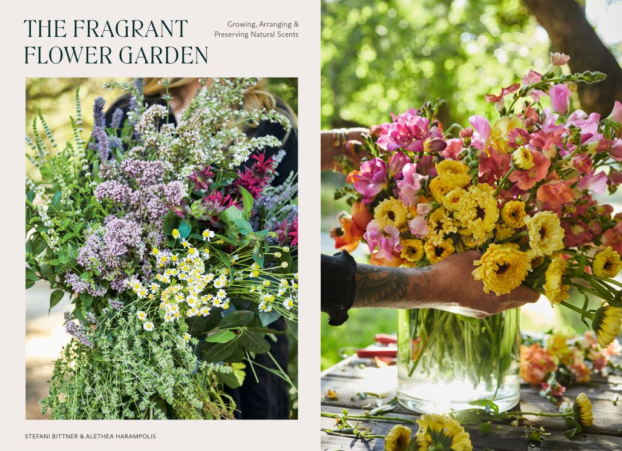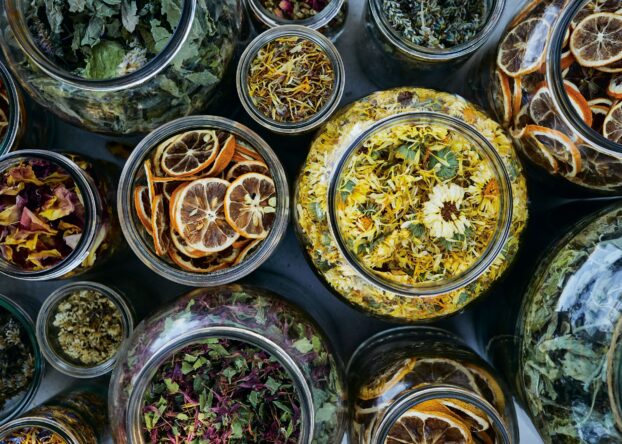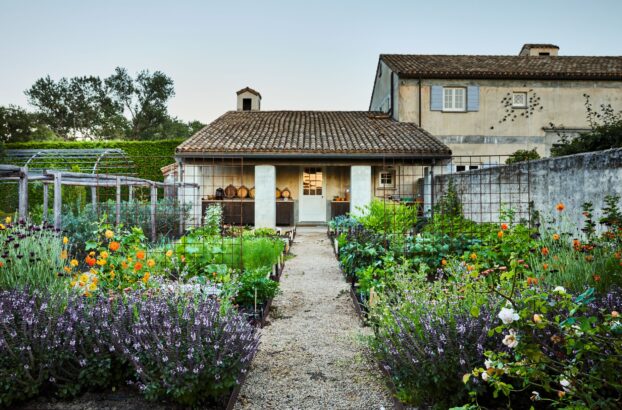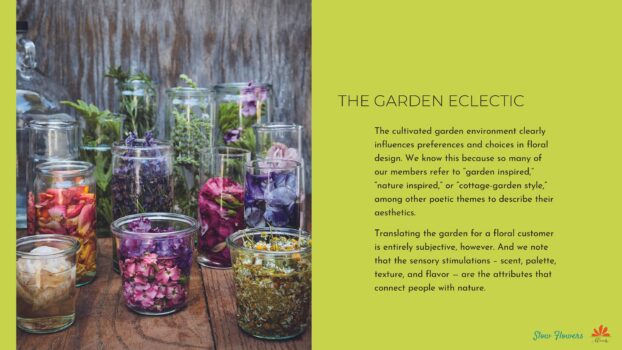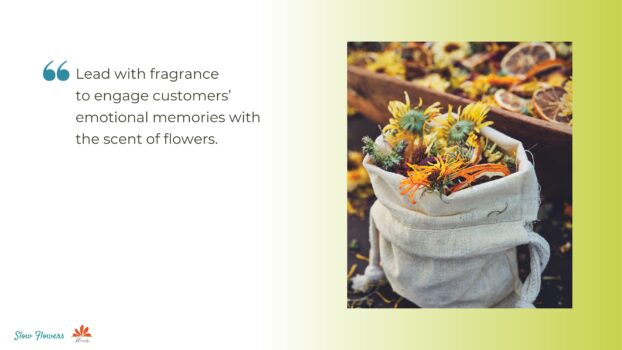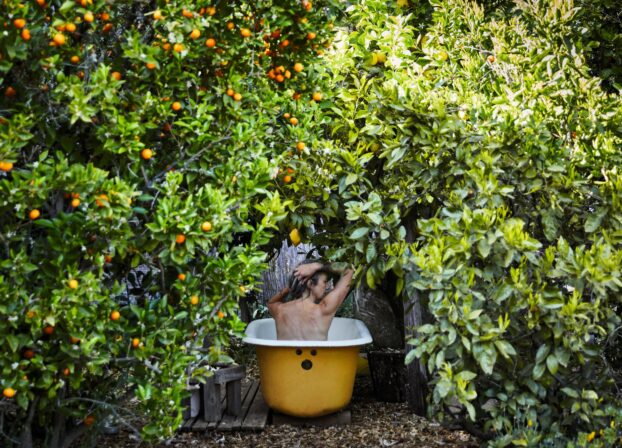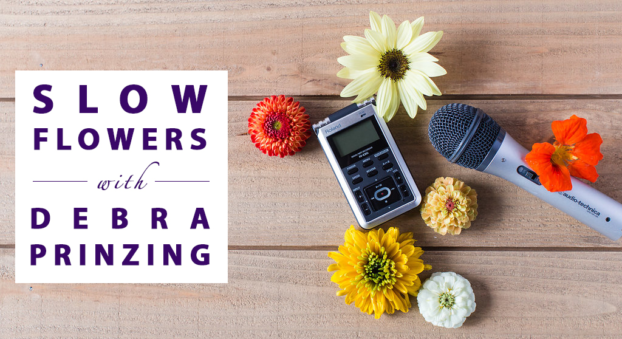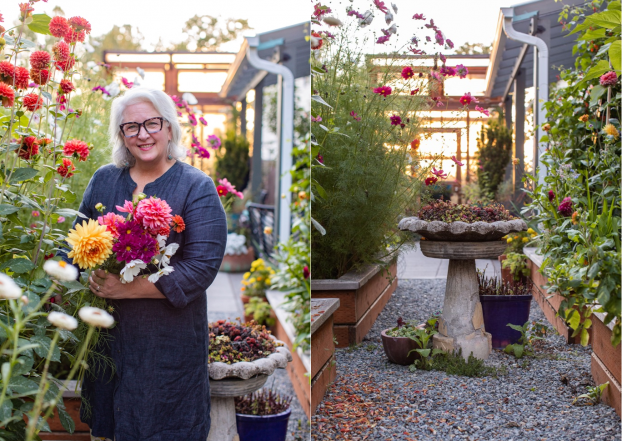Podcast: Play in new window | Download
Subscribe: Apple Podcasts | Podcast Index | | More
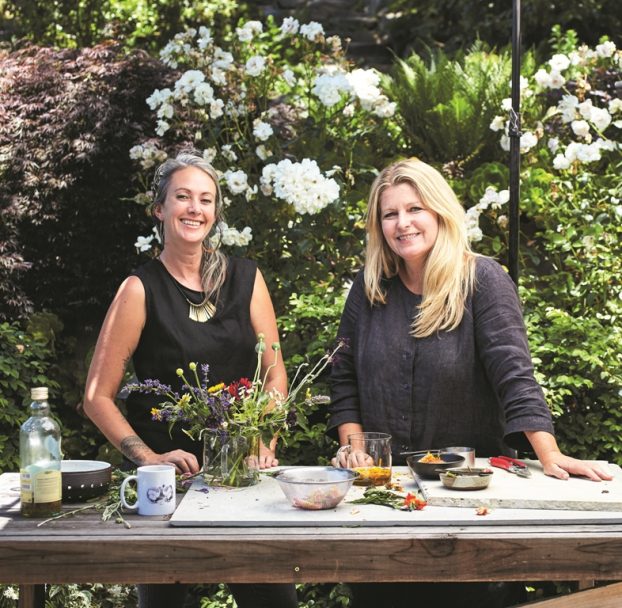
Alethea Harampolis (L), Stefani Bittner (R) – photo by David Fenton
One of the best things about being a veteran garden writer are the friendships I’ve forged over the years with my peers.
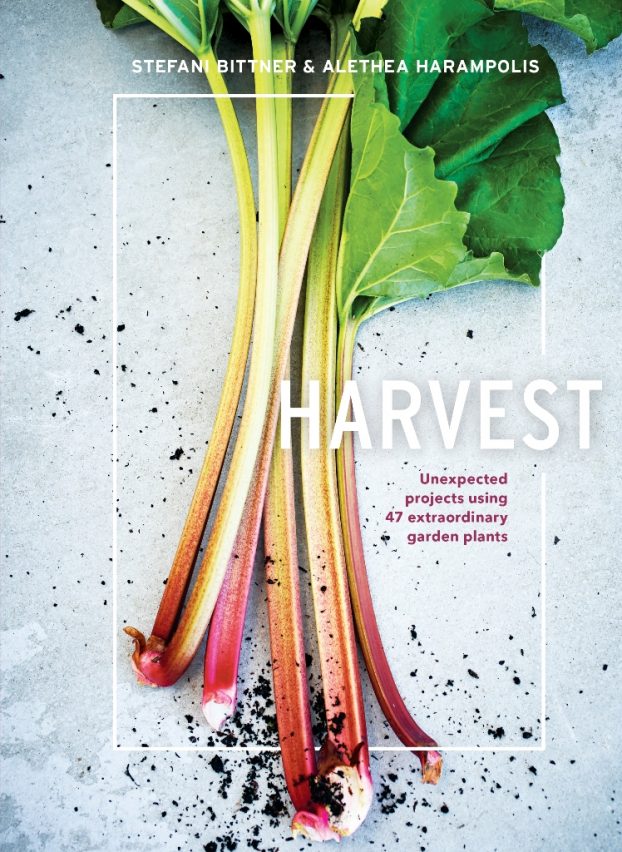 Today’s guests are definitely in that category of favorite professional friends who have become so much more than mere acquantances.
Today’s guests are definitely in that category of favorite professional friends who have become so much more than mere acquantances.
I really value my time with them, although sadly, it’s rare. Stefani Bittner and Alethea Harampolis are partners in Homestead Design Collective, a Bay Area-based landscape design firm.
Stefani is the coauthor with Leslie Bennett of The Beautiful Edible Garden and Alethea is cofounder of Studio Choo, with Jill Rizzo, her coauthor for The Flower Recipe Book and The Wreath Recipe Book. Alethea and Jill are past guests of this podcast, and you can find that episode here.
Since these creatives teamed up to form Homestead Design Collective, they have focused their business on landscapes that are useful and most important, can be harvested year round.
The title of their new book, HARVEST, says it all. I’m so honored that they asked me to write the foreword. In those few hundred words that appear in the opening pages of Harvest, I wrote this:
I once believed that clipping branches and blooms to bring indoors was akin to denuding my garden. But about ten years ago, I began to interview America’s flower farmers and their customers: floral designers devoted to and creatively fueled by domestic and local botanicals. Mesmerized by their uncommon floral crops, I began to regard the incredible beauty of my own backyard for all of its potential. That meant enjoying not just the small quantity of food (berries, herbs and vegetables) that my kitchen garden produced, but appreciating its abundance by displaying garden greenery and flowers in my vases.
This new-old philosophy of living with my garden’s generous harvest is best learned from true practitioners, such as Stefani Bittner and Alethea Harampolis of Homestead Design Collective. These women are also proponents of good design, and they adhere to the guiding philosophy of choosing plants at once both ornamental and useful. Although not farms by any means, our urban and suburban backyards should be used in their entirety, say Stefani and Alethea. The culinary world has its own “nose to tail” way of eating; HARVEST, the book you hold in your hands, introduces the gardener’s version of that idea: call it a “fruit-to-root” way of growing, with an appreciation for all parts of the plant, from the first tender shoots in spring to the pods and hips of late fall.
I’ve learned so much from these two pioneers. Stefani is a role model for landscape designers, inspiring her harvest-minded clients to turn their once-unproductive yards into prolific (and lovely) sources of edible bounty. Alethea is a role model among the farmer-florist crowd, blending edibles with ornamentals; aromatics with the wild-foraged; house plants with weeds — all to create dramatic, moody, seasonal florals for everyday decor and magnificent occasions.
In HARVEST, they celebrate the Slow Food movement on a highly personal scale, integrated with a Slow Flowers ethos. When edibles meet botanicals, we live intentionally with plants throughout the seasons. And when you embrace this practice, you will be richly reward by your garden.
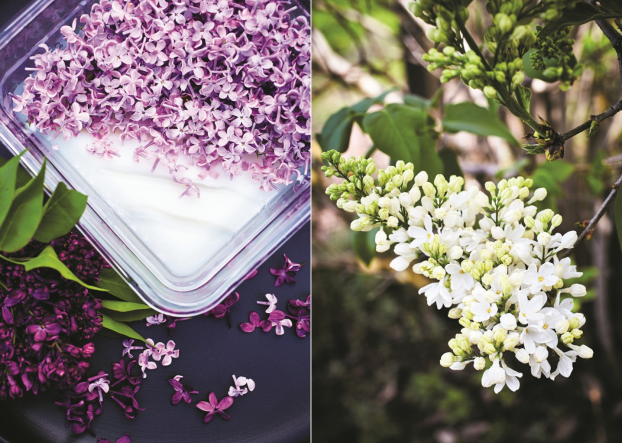
Lilac Flower Cream
LILAC FLOWER CREAM
An ancient French technique, enfleurage is the process of extracting a flower’s perfume into odorless animal or vegetable fat. The process used here is a simple method that will capture the fragrance of spring in a jar. The cream can be used directly on your skin or to flavor favorite sweet dishes. It is best to use the lilac’s tiny blooms straight from the shrub, picking them in the morning when they are the most fragrant.
MAKES TWO 16-OUNCE JARS
32 ounces extra-virgin coconut oil
10 cups lilac blooms picked from the heads in 2 cup increments as needed
Pick 2 cups of lilac blooms. Place the coconut oil in a small saucepan and melt over low heat until it is completely liquefied. Pour the liquid into a 10 by 10-inch (25 by 25-cm) casserole dish and allow it to harden. After the oil has hardened, score it with a butter knife. This will help the scent of the flowers penetrate it more deeply. Layer the tiny lilac blooms onto the oil, covering it with 2 inches (5 cm) of blooms. Place a second 10 by 10-inch (25 by 25-cm) casserole dish upside down atop of the first one. Use electrical tape to seal the two dish edges tightly, and place the dishes in a dark area.
After 48 hours, remove the tape seal and discard the spent blooms. Pick another 2 cups of lilacs, add another 2 inches (5 cm) of flower blooms to the oil, and seal again for another 48 hours. Repeat this process three more times, for a total of five cycles with fresh blooms each time.
Scrape up the oil from the casserole dish, place it into two 16-ounce jars, and seal the lids. Store in a cool, dark place; the flower cream will keep for up to 3 years.
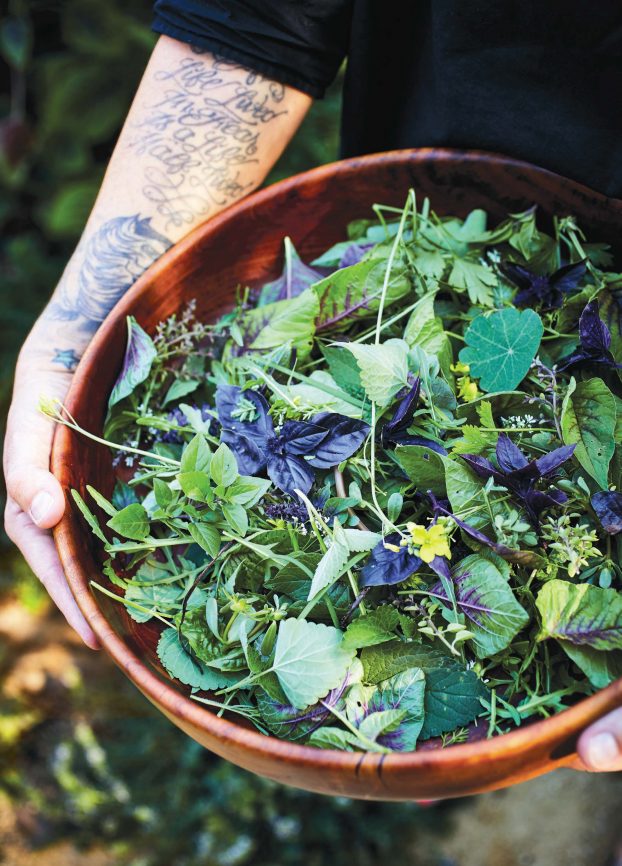
Midseason Herb Salad, from HARVEST
Stef and Alethea maintain that every garden—not just vegetable plots—can produce a bountiful harvest. In their beautifully photographed guide to growing, harvesting, and utilizing 47 unexpected plants, readers will discover the surprising usefulness of petals and leaves, roots, seeds, and fruit.
Learn how to turn tumeric root into a natural dye and calamintha into lip balm.
Make anise hyssop into a refreshing iced tea and turn apricots into a facial mask.
Crabapple branches can be used to create stunning floral arrangements, oregano flowers to infuse vinegar, and edible chrysanthemum to liven up a salad.
This practical, inspirational, and seasonal guide will help make any garden more productive and enjoyable with a variety of projects–organic pantry staples, fragrances, floral arrangements, beverages, cocktails, beauty products, and more–using unexpected and often common garden plants, some of which may already be growing in the backyard.
With the remarkable, multi-purpose plants in Harvest, there is always something for gardeners to harvest from one growing season to the next.
Please enjoy this conversation with my two friends as we discuss their design philosophy and their collaboration on Harvest.
Stefani and Aleathea were recently featured speakers at the Northwest Flower & Garden Show in Seattle and I was able to corner them in a hotel lobby to record this interview.
You can also enter to win the book — thanks to the generosity of Ten Speed Press, publisher of Harvest, we have two copies to give away in a drawing.
To enter, you must post a comment about your most useful garden plant in the comment section below. We’ll draw the winners on March 29th and announce them the following week.
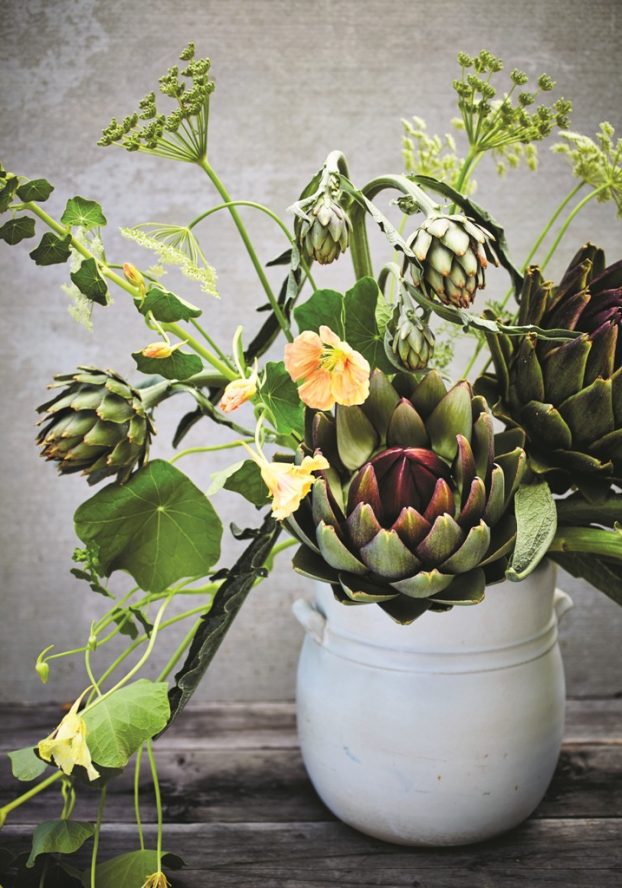
Artichoke arrangement from Harvest
Instructions for the Artichoke Arrangement:
Artichokes are a favorite edible, but few know that their layers of prickly leaves can also be used to create a beautiful focal point in a mixed garden bouquet. Bring inside in a few cuttings from the garden to make a stylish and simple composition.
2 large artichoke heads, stems and leaves attached
1 or 2 stems with several small artichokes attached
5 to 8 stems wild carrot flowers (Daucus carota), 12 to 18 inches (30 to 46 cm) long
2 nasturtium vines with flowers, each 12 to 18 inches (30 to 46 cm) long
Fill a large crock or vase with clean, cold water. Remove any damaged leaves from the stems or leaves that would fall below the water line. Add the large artichoke heads in the front of the crock, with one head resting slightly higher than the other. This creates a focal point and showcases the gorgeous multilayered leaves.
Add in the smaller artichoke stems to the back and left sides of the crock. These heads should sit taller than the larger heads. They add height to the arrangement and create an asymmetrical look. Add in some of the wild carrot stems to fill in the space between the larger and smaller artichokes. These stems should be slightly taller than the small artichoke stems. Place the remaining carrot stems on the back right side of the crock to complement the wild carrot on the left and provide an airy backdrop to the arrangement.
Add the longest nasturtium vine to the front side of the crock, to the left of the large artichokes, so that it drapes over the side of the crock. This creates movement and softens the edge of the vessel. Use the other nasturtium vine to fill any gaps. Make sure that the flower heads are turned to be visible from the front of the arrangement.
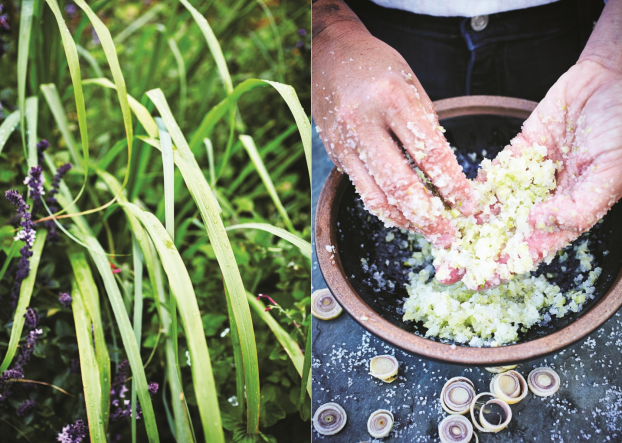
Lemongrass Salt Scrub
Instructions for LEMONGRASS SALT SCRUB
Lemongrass has antibacterial, antioxidant, and other therapeutic properties. After a hard day working in the garden, we appreciate lemongrass as a remedy for our aches and pains. Use this salt scrub on your hands daily or on sore muscles once a week while taking a deep soak in the tub. If you have very sensitive skin, you may want to use the salt scrub only on your hands or substitute brown sugar for the salt as a milder alternative.
MAKES ABOUT 1½ CUPS
1 or 2 fresh stalks lemongrass
1 cup sea salt
½ cup almond or olive oil
Finely chop the lemongrass by hand or in a food processor. Combine the chopped lemongrass, salt, and oil in a bowl and mix with a wooden spoon—or even better, use your hands. The texture should be moist enough to hold together but not overly oily. (If it does get too oily, add a pinch more salt.) Scoop the scrub into a 12-to 16-ounce jar and seal with a lid. Use within 2 weeks.
To use, simply spoon a small amount into your hands, gently rub it in, and then rinse your hands with warm water.
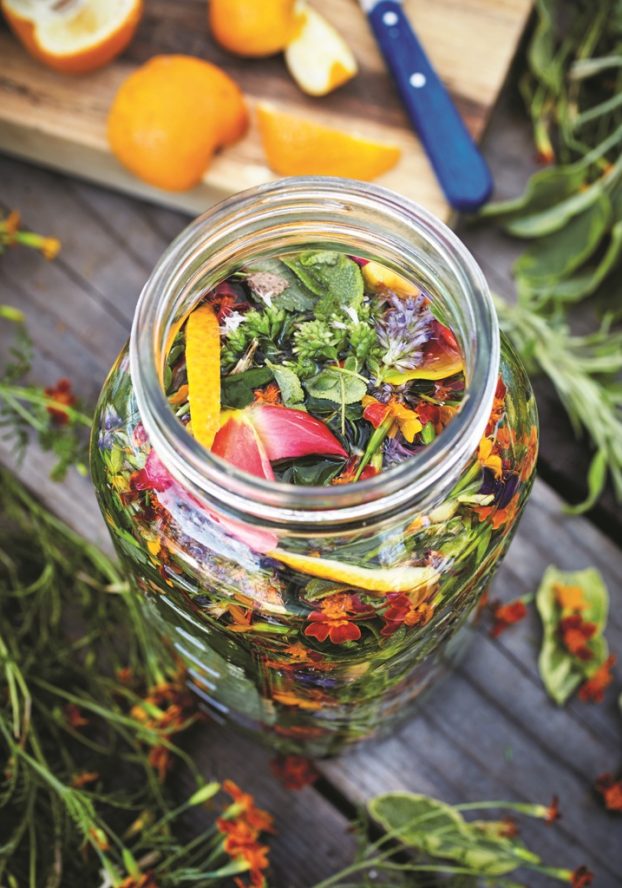
Marigold Bitters
Instructions for Marigold Bitters (AMARO)
Amaro is an Italian herb-infused bitter liqueur, originally used as an after-dinner digestif, chilled or over ice. Recently, however, there’s been a bitters revival, with cocktail enthusiasts mixing the bittersweet digestif into beverages beyond just classic cocktails such as the Manhattan and the old fashioned.
Gem marigolds are a perfect component because of their distinct bitter flavor and for the lovely amber hue that results. For amaro’s signature tartness, we’ve added some chinotto orange rind, the key ingredient in Campari, the popular Italian herbal aperitif.
MAKES 1 QUART
Enough herbs and edible flowers to fill a 1-quart jar, for example:
- 1 cup gem marigold flowers and leaves
- 1 to 3 sage leaves
- 2 to 6 anise hyssop flowers and leaves
- 1 sprig rosemary
- 1 to 6 lavender blooms
- Small bunch of thyme (such as French, English, or lemon)
- 1 to 6 calendula flowers
- 1 to 6 bee balm flowers and leaves
- Small handful of rose petals
- 1 to 8 viola petals
5 to 10 alpine strawberries or other berries
Rind of 2 chinotto oranges
2 (750-ml) bottles Hangar One Vodka or a similar good-quality, unflavored vodka
SIMPLE SYRUP
MAKES ABOUT 1-1⁄4 CUPS
1 cup water
1 cup organic sugar
Gently rinse the herbs and flowers, leaving the blooms intact to capture the bitter attributes of their centers. Add them all, along with the berries and citrus rind, to a 1-quart jar. Fill the jar with vodka to just below the rim (you might not need it all) and seal with a tight-fitting lid. Store it in a cool, dark place.
Check the amaro daily or every couple of days, and give it a good shake to ensure that there are no floating leaves or flowers. After 4 weeks, taste the amaro. If you prefer it stronger, allow it to infuse for another week or so. Once you’ve achieved the flavor you like, strain out the herbs, edible flowers, berries, and rind.
Next, make the simple syrup. Combine the sugar and water in a nonreactive pan. Place over medium-high heat and bring to a simmer, stirring to prevent sticking. Once the sugar has dissolved (about 5 minutes), remove the mixture from the heat and let it cool slightly.
Add 1 cup of the simple syrup to the strained amaro liquid and let infuse for an additional 2 weeks, then taste. If you find the amaro more bitter than you’d like, add more simple syrup but remember the sweetener is meant to take the edge off of the bitter taste rather than mask it. Once the bitters are to your liking, store indefinitely.
 The Slow Flowers Podcast has been downloaded more than 170,000 times by listeners like you.
The Slow Flowers Podcast has been downloaded more than 170,000 times by listeners like you.
THANK YOU to each one of you for downloading, listening, commenting and sharing. It means so much.
If you value the content you receive each week, I invite you to show your thanks and support the Slow Flowers Podcast with a donation — the button can be found on our home page in the right column.
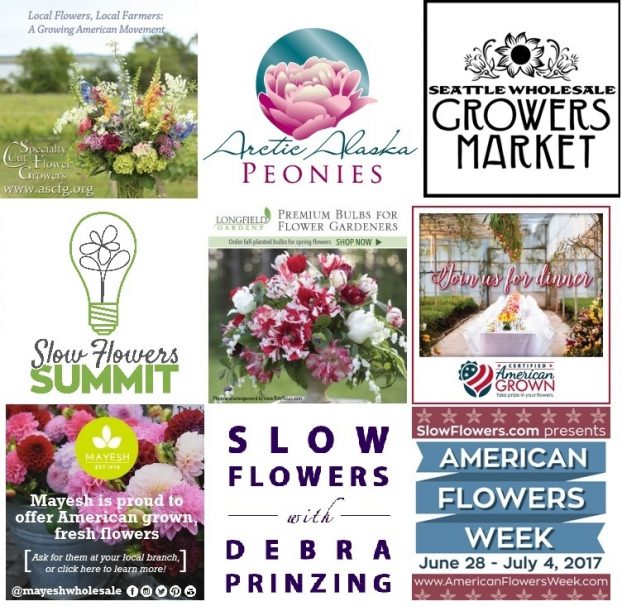 Your contributions will help make it possible to transcribe future episodes of the Podcast.
Your contributions will help make it possible to transcribe future episodes of the Podcast.
Thank you to our lead sponsor for 2017: Certified American Grown Flowers. The Certified American-Grown program and label provide a guarantee for designers and consumers on the source of their flowers. Take pride in your flowers and buy with confidence, ask for Certified American Grown Flowers. To learn more visit americangrownflowers.org.
We’re also grateful for support from Arctic Alaska Peonies, a cooperative of 50 family farms in the heart of Alaska providing high quality, American Grown peony flowers during the months of July and August. Visit them today at arcticalaskapeonies.com
And welcome to our newest sponsor, the Seattle Wholesale Growers Market, a farmer-owned cooperative committed to providing the very best the Pacific Northwest has to offer in cut flowers, foliage and plants. The Growers Market’s mission is to foster a vibrant marketplace that sustains local flower farms and provides top-quality products and service to the local floral industry. Find them at seattlewholesalegrowersmarket.com.
Longfield Gardens has returned as a 2017 sponsor, and we couldn’t be happier to share their resources with you. Longfield Gardens provides home gardeners with high quality flower bulbs and perennials. Their online store offers plants for every region and every season, from tulips and daffodils to dahlias, caladiums and amaryllis. Visit them at lfgardens.com.
And finally, thank you Association of Specialty Cut Flower Growers. Formed in 1988, ASCFG was created to educate, unite, and support commercial cut flower growers. It mission is to help growers produce high-quality floral material, and to foster and promote the local availability of that product. Learn more at ascfg.org.
I’m Debra Prinzing, host and producer of the Slow Flowers Podcast. Next week, you’re invited to join me in putting more American grown flowers on the table, one vase at a time. And If you like what you hear, please consider logging onto Itunes and posting a listener review.
The content and opinions expressed here are either mine alone or those of my guests alone, independent of any podcast sponsor or other person, company or organization.
The Slow Flowers Podcast is engineered and edited by Andrew Brenlan. Learn more about his work at KineticTreeFitness.com.
Music credits:
Blue Jay; Cottonwoods
by Blue Dot Sessions

